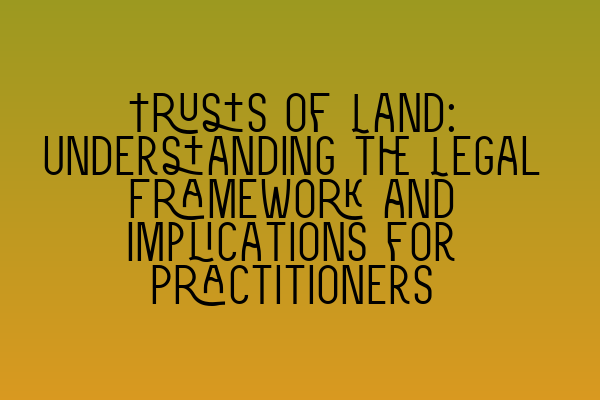Trusts of Land: Understanding the Legal Framework and Implications for Practitioners
Introduction
Trusts of land play a significant role in property law. As a legal practitioner, it is essential to have a comprehensive understanding of the legal framework surrounding trusts of land and the implications they can have for both clients and practitioners. In this blog post, we will delve into the intricacies of trusts of land, exploring key concepts, legal principles, and practical considerations that every property law practitioner should be aware of.
1. What is a Trust of Land?
A trust of land arises when property is held by one or more individuals (the trustees) for the benefit of others (the beneficiaries). Under the Trusts of Land and Appointment of Trustees Act 1996, a trust of land is created when there is an express declaration of trust or when the circumstances imply a trust.
2. Legal Framework for Trusts of Land
To better understand the legal framework surrounding trusts of land, it is crucial to examine the key legislation governing this area. In addition to the Trusts of Land and Appointment of Trustees Act 1996 mentioned earlier, the Law of Property Act 1925 and the Land Registration Act 2002 also play essential roles in governing trusts of land.
The Law of Property Act 1925 sets out the requirements for the creation and operation of trusts, including the need for certainty of intention, subject matter, and beneficiaries. It also establishes the legal principles that determine the powers and duties of trustees, as well as the rights and interests of beneficiaries.
On the other hand, the Land Registration Act 2002 provides the statutory framework for the registration of land in England and Wales. It introduces the concept of legal and beneficial ownership of land, which is particularly relevant when dealing with trusts of land. Practitioners must fully grasp the intricacies of both acts to effectively advise their clients on trusts of land matters.
3. Types of Trusts of Land
There are several types of trusts of land that practitioners should be familiar with. These include:
– Bare Trusts: In a bare trust, the legal ownership of the property is held by the trustees, but the beneficiaries have the absolute right to both the income and capital of the property.
– Discretionary Trusts: Discretionary trusts allow the trustees to exercise discretion when distributing the income or capital of the property to the beneficiaries. This type of trust provides flexibility for the trustees but requires careful management and decision-making.
– Constructive Trusts: Constructive trusts arise when a person holds property on trust for another, even if there is no formal trust agreement. These trusts are often imposed by the courts to prevent unjust enrichment or rectify wrongdoing.
– Resulting Trusts: Resulting trusts occur when the legal title to the property is held by the trustees, but the beneficial interest belongs to someone else. These trusts can arise when a property is purchased jointly but the parties’ contributions to the purchase price are unequal.
4. Implications for Practitioners
Understanding trusts of land is crucial for property law practitioners as it has several implications for their practice. Here are some key considerations:
– Drafting Trust Documents: Practitioners may be required to draft trust documents, including trust deeds and settlor agreements. Properly understanding the legal framework and requirements ensures that these documents are accurate, clear, and enforceable.
– Advising Clients: Clients may seek advice on various matters related to trusts of land, such as the creation of trusts, rights and obligations of trustees and beneficiaries, and the potential implications of entering into a trust arrangement. Practitioners must be able to offer sound legal advice based on a strong understanding of the legal framework.
– Dispute Resolution: Disputes may arise concerning trusts of land, including disagreements between trustees and beneficiaries or challenges to the validity or interpretation of trust documents. Practitioners must be equipped to handle these disputes effectively, including exploring alternative dispute resolution methods where appropriate.
Conclusion
Trusts of land are a fundamental aspect of property law, and understanding their legal framework and implications is paramount for practitioners. By familiarizing themselves with the relevant legislation, types of trusts, and practical considerations, practitioners can provide expert advice, draft accurate documents, and effectively resolve disputes related to trusts of land.
For further resources and exam preparation materials for the SQE exams, refer to the following links:
– SQE 1 Practice Exam Questions
– SQE 1 Practice Mocks FLK1 FLK2
– SQE 2 Preparation Courses
– SQE 1 Preparation Courses
– SRA SQE Exam Dates
Remember, staying up-to-date with the latest developments in trusts of land and continuously refining your knowledge and skills will ensure that you are a competent and successful property law practitioner.
